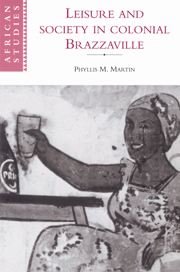Book contents
- Frontmatter
- Contents
- List of plates
- List of maps
- List of tables
- Acknowledgements
- List of abbreviations
- Introduction
- 1 An African crossroads, a frontier post and a colonial town, c. 1880–1915
- 2 Taking hold of the town, c. 1915–1960
- 3 The emergence of leisure
- 4 Football is king
- 5 About the town
- 6 Dressing well
- 7 High society
- Conclusion
- Notes
- Bibliography
- Index
- Titles in the series
4 - Football is king
Published online by Cambridge University Press: 09 November 2009
- Frontmatter
- Contents
- List of plates
- List of maps
- List of tables
- Acknowledgements
- List of abbreviations
- Introduction
- 1 An African crossroads, a frontier post and a colonial town, c. 1880–1915
- 2 Taking hold of the town, c. 1915–1960
- 3 The emergence of leisure
- 4 Football is king
- 5 About the town
- 6 Dressing well
- 7 High society
- Conclusion
- Notes
- Bibliography
- Index
- Titles in the series
Summary
The title of this chapter comes from a comment by Fulbert Kimina-Makumbu, Congo's premier sports journalist, who said in an interview: ‘Football is everyone's sport, football is king.’ He was contrasting it with other sports such as basketball, athletics, cycling, volley-ball and boxing. All have their adherents but, since it was first played in Poto-Poto and Bacongo, football has retained its overwhelming popularity. The phrase ‘King Football’ is also used in the semi-autobiographical account of Jean-Claude Ganga, for many years Minister of Sport in the Republic of Congo. For a former star of the Bacongo team, Diables Noirs, football is ‘natural’ for a Congolese boy. It is fun, cheap, and easy to learn. It can be enjoyed at any level, for ‘it involves no special talent’. It is a game not just for players, but also for spectators, who can be fiercely partisan. A history of a top Poto-Poto club, Renaissance, recalls a heated controversy in the early 1950s which ended by splitting both the team and fans. As a result, ‘many households and families were involved in real dramas in Poto-Poto. Children and nephews were chased from their father's house, spouses torn from their spouses, relations wouldn't speak to each other.” While the hyperbole of a sports writer is probably present in the above statement, the intensity of emotions aroused by football is confirmed by other incidents described in this chapter. Football was also a socializing agency for young migrant workers, for through individual skills a boy or young man could achieve fame in the community and quickly pass from newcomer status to acceptance.
- Type
- Chapter
- Information
- Leisure and Society in Colonial Brazzaville , pp. 99 - 126Publisher: Cambridge University PressPrint publication year: 1996

